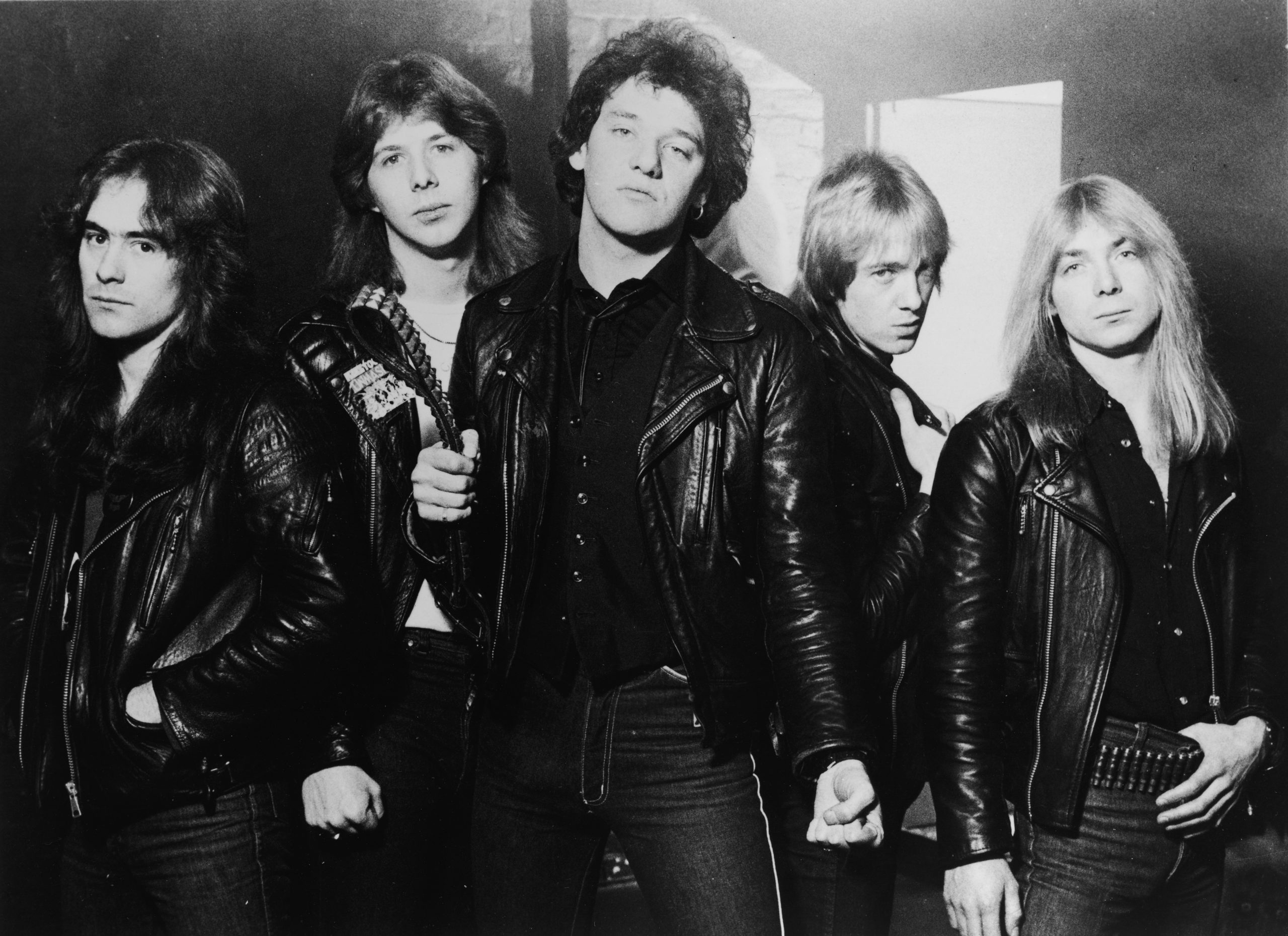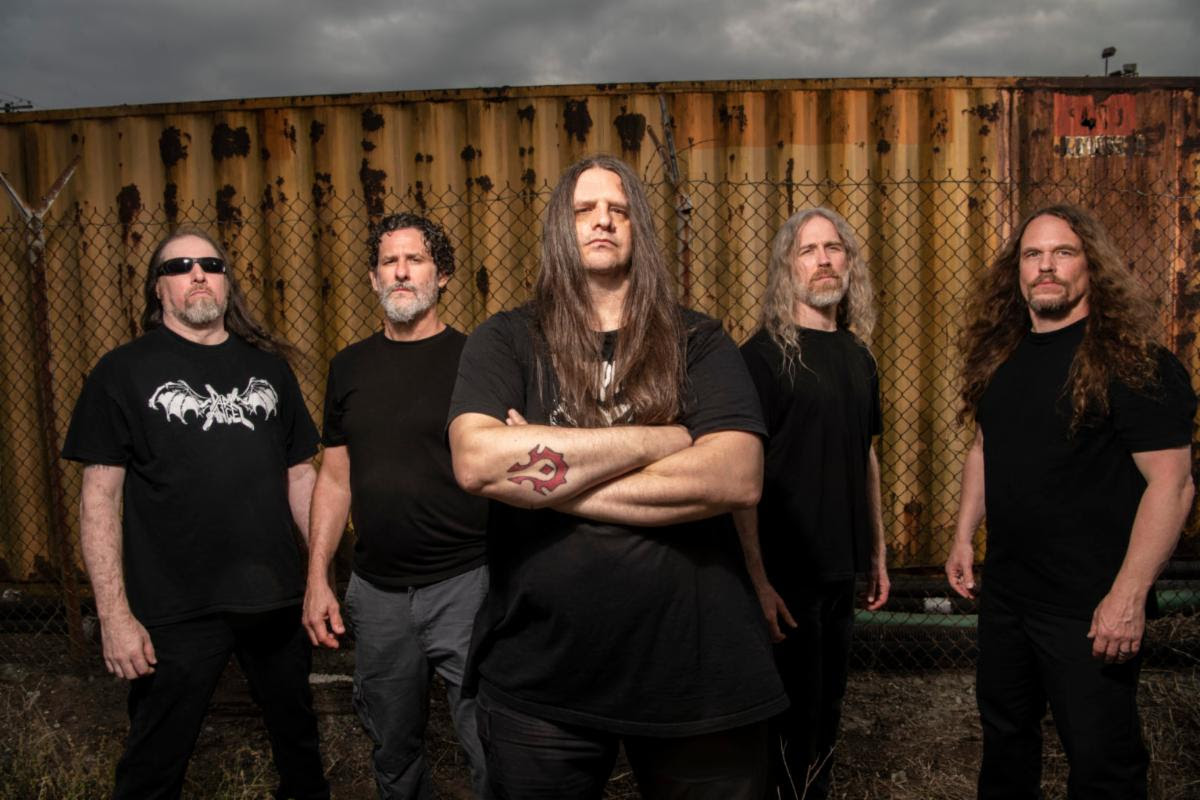Formed the same year that Sinead O'Connor stood in front of a camera crying and singing a Prince song, Sweden's Opeth began their journey in the typical old-fashioned way wherein a couple of people who play instruments meet a couple other people who do the same, and they find out that they like the same kind of music and don't annoy the living shit out of each other, so they form a band. Despite most human beings not having the capability to walk and chew gum at the same age, Opeth vocalist/guitarist Mikael Åkerfeldt was just 16 years old when he was asked to join the band.
Nearly three decades later, Opeth are one of heavy metal's most widely respected and polarizing acts, captivating and even confusing fans over the course of what's now 12 albums (tallied here as 11, because a pair of them were re-released as a two halves of a double-LP). A product of their generation, the Opeth's enormous success comes primarily by way of them incorporating all aspects of their influences into the music, as opposed to filtering out what isn't strictly heavy. As a result, Opeth's music has continually taken on the qualities of multiple sources, all while being channeled through the creative minds of the individual musicians.
Bypassing the corpse paint, unabashed bigotry, and general dumbassery of many of their contemporaries at the time, Opeth made the courageous decision to dedicate their energy, focus, and time to the music they were creating. Unsurprisingly, the results and subsequent rewards have served the band and the metal genre well, allowing for challenges and even changes to long held and outdated notions of what constitutes membership in the cool-kids-only club. While no documentaries exist (yet) featuring footage of Åkerfeldt or any of his bandmates wandering aimlessly through the snow while staring off in deep thought, Opeth's story is one that involves nearly every inspiring trait of rock 'n' roll at its most rewarding.
Over the years the band has made the kinds of decisions that usually cause a band to end up under a headstone that reads: "RIP Career," yet as supposedly drastic or sudden as those changes have been, Opeth have achieved the almost impossible task of keeping fans interested if not always engaged with everything they do. Considered by many to have left the metal convention "like two albums ago," Opeth earned a permanent pass and respect in the genre from the get-go with their 1995 debut, Orchid, an album widely considered to be one of the most important in the independent metal scene.
Though not a slight against his former, current, and probably future bandmates, Åkerfeldt's creative inclinations are the driving force for Opeth, a characteristic that hasn't necessarily worked against the band at all so far. The 42-year-old Stockholm native long ago established himself as one of the genre's most formidable guitarists and one of its most forward-thinking artists. As such it's not surprising that Opeth's lineup looks like a spreadsheet printout of Sweden's musical population. Considering that perpetually rotating lineup, it's that much more impressive that Opeth have been able to maintain their trajectory without any kind of creative implosion.
With the recent release of Sorceress, Åkerfeldt and his bandmates have continued what's been a trend now for two releases far into the prog-rock spectrum, leaving behind heavy metal and also the happiness of fans whose heads still remain tilted to one side at 2011's Heritage. Regardless of those varying directions, however, Åkerfeldt has remained a clear example of artistic independence, leading Opeth into the privilege afforded those musical acts who achieve acclaim, success, and the rarity of being truly memorable.
11. Heritage (2011)

A divisive album for even the group's most loyal fans, Heritage came three years after what still remains Opeth's most experimental album, 2008's Watershed. For many, what was once considered the quintessential metal band had transformed into something more akin to Blue Öyster Cult than Bathory. All due respect to the normative responses of upset fans, but the directional shift in Heritage surprised only those listeners who hadn't paid attention to what Opeth had done on the records leading up to that release. As Åkerfeldt and company began incorporating more clean vocals and fewer straightforward double-kick death metal song structures, fans and even critics began incorporating words/phrases like, "What in the actual fuck?" and "Please, God, just one grunt. Please."
The fact is, though, that Heritage isn't a bad album, but it's not a good one, either. And while the vocals and overt presence of a Hammond B3 organ might be easy targets for those looking to pinpoint why the album wasn't better, the honest truth is that Heritage is directionless and clunky. It's not that Opeth used new textures, structures, or instruments, it's that they didn't quite make them fit together. Despite the album's flaws, Heritage does have its moments where Opeth rise to the occasion in reminding you just how versatile and all-encompassing the group can be, regardless of how heavy (or not) the music is.
10. Pale Communion (2014)
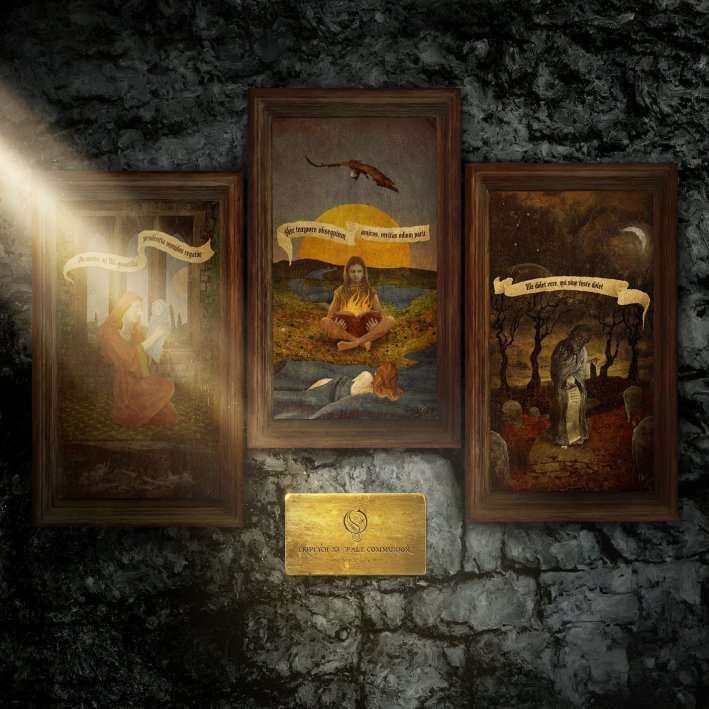
And just three years later, Opeth adjusted their prog lenses and made an album that sounded like a focused and more melodic version of Heritage. Fans praying to sweet Satan or Mephistopheles or some shit that the group had only been going through one of those Music For "The Elder" phases of suckery were quickly slapped into the cold reality that Mikael Åkerfeldt simply does not give a happy fuck what anyone, fan or critic, expects of him. See: Pale Communion. It's not too farfetched to suggest that Heritage was the result of an apprehensive band venturing fully into unchartered waters, and Pale Communion was the same band comfortable in their new surroundings.
Unlike the restricted vocalizations of its predecessor, Pale Communion shows a remarkable increase in Åkerfeldt's vocal presence; most notably in that his range isn't just limited to whispers or bowels-of-hell belching. Beginning with the straight-up Moody Blues-worshipping "Eternal Rains Will Come," the album twists, turns, glides, and spirals over and over again ad nauseum, and then it ends. It's a good album, yes, but that fine line between a good album and a great one is oftentimes spelled r-e-s-t-r-a-i-n-t. Ridiculous, running length isn't one of prog's defining characteristics. It's a band's innate ability to command every single minute of a song, regardless of whether it's three or 30.
Though an overall improvement from Heritage, Pale Communion offers a lot of sugar for a dime. The musicianship is superb. The focus and cohesion are there. The vocals are front and center with strong melodies. But where the hell is it going? Much of Pale Communion's dragging moments would be incredible to hear were it not for the fact that you've heard them dozens of times before by other prog rock bands who wrote them decades ago. It's no secret that Åkerfeldt looks at bands like King Crimson and Goblin with reverence. And that's fine. Those are amazing bands to revere and borrow from, but as Pale Communion slogs toward the hour mark, it's evident that as good as the music is, it really doesn't offer much we haven't already heard, and for a band like Opeth, that's just not good enough.
9. Sorceress (2016)
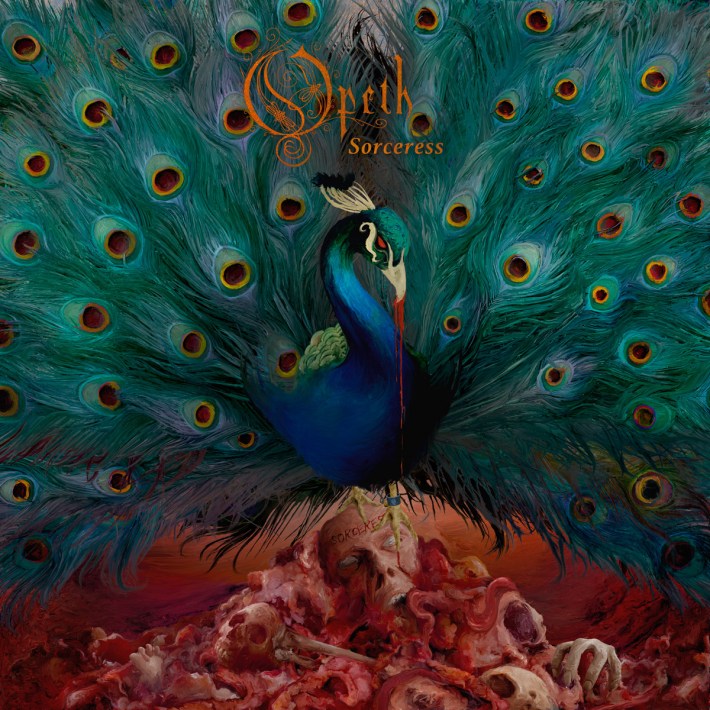
After spending the two previous albums in a sort of self-discovery à la existentialism via prog rock, Opeth succeeded in creating an album that actually sounds like prog Opeth as opposed to Opeth doing prog. If Heritage and Pale Communion were the band's "breaking in the prog vehicle" albums, Sorceress is Opeth firing on all cylinders with the same kind of focus and surety that gave muscle to their earlier albums. Most impressive about Sorceress is the fact that it doesn't find the band employing the feast-or-famine approach of the album's two predecessors. The band finally sounds comfortable allowing characteristics of their more metal-inclined phase to coexist with their current Goblin/Moody Blues/King Crimson-worshipping sound.
As much control as he wields in the band, it wouldn't be all that shocking if it came out that Åkerfeldt had made a conference call to all band members before writing Sorceress to let them know that they could down-tune again. Even with that, though, "old school" Opeth fans who might be slobbering at the very idea of hearing the angelic sound of a trademarked Åkerfeldt grunt will once again be relegated to disappointment. Sorceress is very much a prog rock album. The only difference now is that it's Opeth and not the idea of transition holding the reins. And let's be honest, at this point it's best to avoid anticipatory asphyxiation and just accept the fact that some bands just don't like churning out the same shit over and over again.
That said, the album isn't perfect by any means. Like many prog rock albums, there are moments likely to induce, "Is this the second or third organ solo?" listener responses. But, again, you get what you pay for, and it's not like Opeth have been mindfucking fans with cleverly hidden prog surprises in some grand exercise in fan trolling. Sorceress isn't as good an album as several others in Opeth's repertoire, no. But it doesn't have to be. Those albums have been made, and a band's only obligation to listeners is honesty. Even if the results cause confusion, duress, and resentment, honest output is an admirable rarity. By no means does it guarantee success in effort and Opeth's recent years have been proof of that. With Sorceress, though, the band's footing in their sound is as sure as it's been in over a decade.
8. Ghost Reveries (2005)
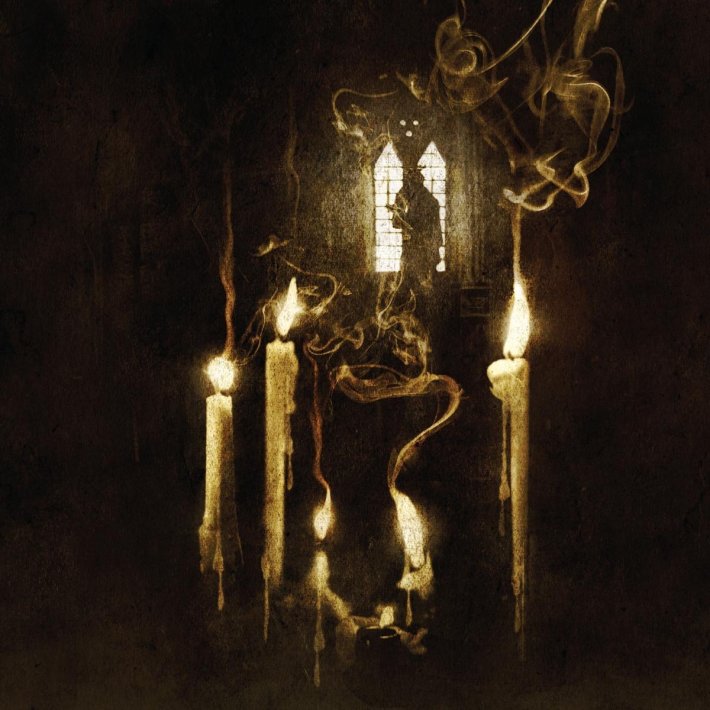
In retrospect, Ghost Reveries looks like a sure thing sandwiched between two of Opeth's most risky and, as it would turn out, polarizing albums. Released three years prior to Ghost Reveries, the dual album Deliverance/Damnation showcased the band's most balanced work to date; while the 2008 release of Watershed was essentially Opeth saying, "Fuck it" in almost every musical way imaginable over the course of seven tracks much to the confusion, delight, chagrin, and onset metal depression of fans everywhere. Though not a detraction of the album, much of what Ghost Reveries offers is a bit like a, "Hey, we can still do the straight-up heavy shit" kind of reassurance from the band.
In that regard, Ghost Reveries is a great collection of songs that borrow from the wide-ranging creative inclinations of what was at that time Opeth's catalog so far. The album doesn't offer anything substantially new or wondrous as much as it works as a reliably great record from one of heavy metal's most reliably great bands. One of the album's most impressive feats is that it found Opeth managing to remind everyone they could still level you with their heavy side but also cuddle your eardrums at the same time in the same song. A dynamic the band had explored four years earlier on Blackwater Park, Opeth's innate ability to use contrasts had gone from tendency to characteristic.
Adding to what probably looked like a storage unit instead of a studio, Ghost Reveries saw Opeth's ever-expanding use of traditionally "totally not metal" (read: absolutely metal) instruments like the mellotron, Hammond organ, and piano, used in ways that weren't relegated to that one wimp song you skip past so you don't seem like a wimp because God forbid. What's more is that by the time of its release, Ghost Reveries featured the umpteenth lineup change for Opeth and yet still retained every bit of the band's musical clout. Though the album's material isn't necessarily daring, it certainly worked in removing any doubts that Opeth's music was more than capable of taking a battering ram to your face as it was in offering a shoulder on which to quietly sob.
7. Watershed (2008)
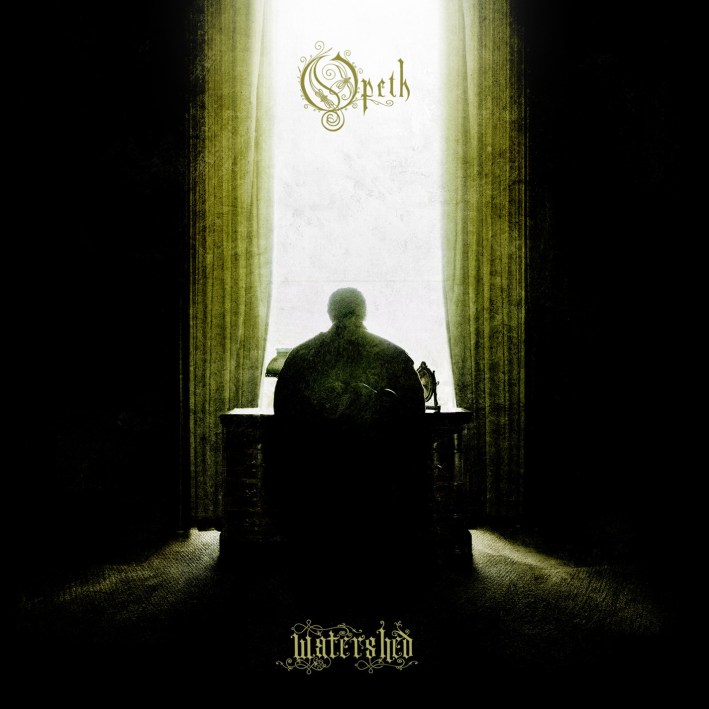
For fans whose asscheeks were still firmly clenched in the wake of Damnation/Deliverance, Watershed was, well, one of those moments. If you weren't already on board with Åkerfeldt's creative restlessness by the time Watershed rolled around, the album was like a really long, proggy farewell. But what was initially received with flabbergasted surprise was, again, another signature move by a band who'd been doing similar things for what was, at that point, over a decade.
Widely considered a benchmark in the metal world and specifically of the prog-metal variety, Watershed was to the three albums prior to its release what Blackwater Park had been to its four preceding albums. The album once again saw Opeth creating challenging music, only this time the confrontation wasn't limited to fans or critics. Watershed called into question the hermetic, tiny sandbox tendencies of heavy metal as a genre and culture. Much like when Thom Yorke (probably) told Johnny Greenwood, "Here. Bang on this pot," during the recording sessions for Kid A, nothing was off the table save for expectation with Watershed.
Though Opeth had always experimented with and, at times, fully embraced their inner prog rock nerds, Watershed wasn't a trip down 11-minute-long-keyboard-noodling lane. Most of the album's tracks are lengthy, sure, but what handful of Opeth songs weren't? The difference with Watershed is that the songs are deceptively frenetic, darting from one end of the musical spectrum to the other, blurring contrasts to the point where they become interchangeable. With Watershed, whatever boundary existed for the band between loud and soft became invariably blurred. Released the same year that Korn's Brian Welch found The Lord and Metallica found their balls again, Watershed set its creators even further apart from the rest of the pack than they already were, somehow representing everything and nothing about metal in tandem.
Despite every second of their running time being spent teetering at the edge of going off the rails, the music of tracks like "Heir Apparent" and "The Lotus Eater" seems to thrive on the chaos it flirts with yet astoundingly never losing its core structure. Where bands like the Mars Volta had taken prog-metal to new incomprehensible heights of how to smash your computer keyboard with your fist until you get a song title, Opeth released what still remains one of the most intrepid metal releases of the last decade.
6. Still Life (1999)
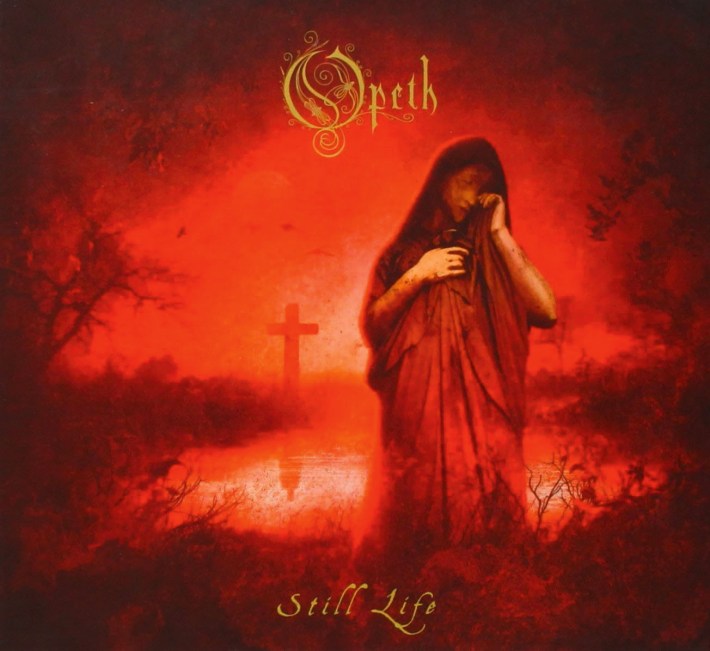
One of the band's concept albums, Still Life's storyline (such as it is) is saved by the music. Released just one year after My Arms, Your Hearse (another concept album), Still Life is in many ways a continution of its predecessor's musical structure. Often regarded as interchangeable with that album in many ways, Still Life does retain many of those qualities but also found Opeth delving further down the progressive rabbit hole than ever before.
Their first album as a member of the revered Peaceville Records label, Still Life provided an interesting opportunity for Opeth in that the band could either ape themselves and repeat what had gotten them signed to the label in the first place, or, in true Opeth fashion, just do whatever the hell they wanted. Obviously the band didn't torment themselves over the choice for too long and as a result ended up creating Still Life. More noteworthy than just its similarities to MAYH are the various subtle changes in style and delivery that would eventually become the band's M.O.
At the risk of being redundant, Opeth's proclivity for opposing dynamics in their music was apparent from the outset with their 1995 debut, Orchid, and while that capability is remarkable it doesn't necessarily elevate a band from good to memorable. Opeth's indelibility is due almost completely to how the group has shaped those dynamics to fit the specific musical direction of each album. To provide an analogy, taking into account the wide span of Opeth's disparate sounds from album to album, that's essentially like rebuilding the entire body of a car and only keeping the engine for every time you decide to bust loops in your Accord.
With Still Life, Opeth's gradual transition into the band they would be throughout the next five albums reached its completion of sorts as the album's followup would see a significantly different band emerge after only a two-year break. For all its musical digressions and progressive tendencies, Still Life contains some of the band's most deliberately unpolished music alongside some of their initial ventures into songs featuring the exclusive use of clean vocals. In what became one of the band's most immediately recognizable trademarks, Opeth's inclination for contrasts was no longer limited only to the music with Åkerfeldt switching with ease between hellacious growl and subdued baritone.
5. Morningrise (1996)

Considering that their debut album had come only a year earlier, Morningrise is an even more stunning achievement for Opeth. Granted, due to release delays the band had already written most of this album's material by the time Orchid was released, but even with that, the level of growth and ability to adapt to their own self-imposed compositional challenges were an early indication of just how much Opeth were willing to put into every aspect of their music. In that way, while not a better record than Orchid, Morningrise was an early look at the band's versatility, and a continution of their penchant for marrying prog rock to metal.
Though conventionally a metal record, Morningrise was the first of many examples of Opeth going in a new if sometimes subtle direction with each album. With its five songs, Morningrise is like a listening exercise in just how many times a band can change dynamics during the course of one song. At first glance, a 20-minute song like "Black Rose Immortal" might elicit a justifiable response of: "Absolutely not," yet Opeth managed to avoid overwrought wankery due in no small part to their managing to give structure to what could easily be directionless music.
At the time of its release, Morningrise offered a perspective on the virtually limitless musicianship of Opeth and specifically Åkerfeldt. Regardless of fan allegiance, it would be a damn near impossible argument to consider the guitarist as anything less than genius, with the primary evidence coming from his instinct for finding a common melodic thread within an uncommon and often complex series of twists and turns. Joanna Newsom notwithstanding, offering listeners not one or two but five songs that go past the "Holy shit, is this still the same song" mark, is a risky endeavor. Then again, that's been this band's calling card from the start.
4. Deliverance/Damnation (2002-2003)
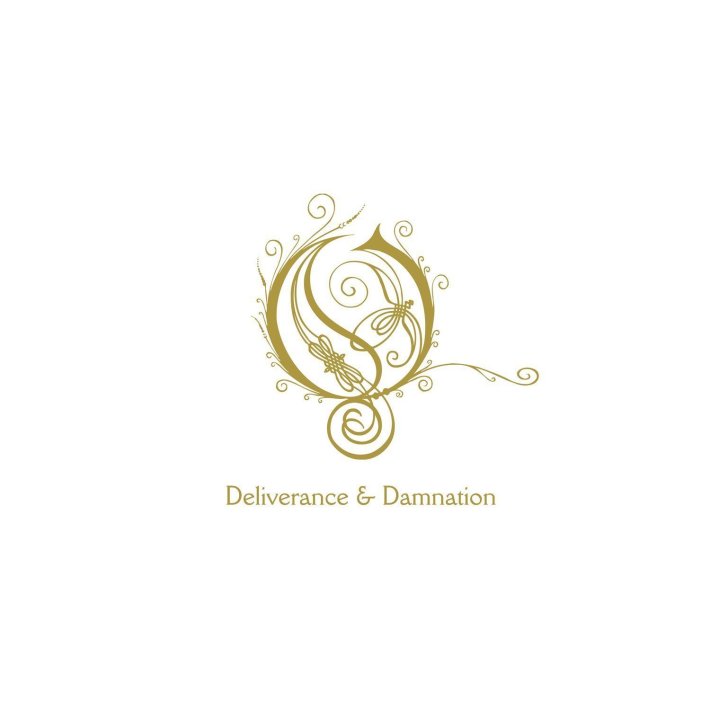
Though released five months apart, these two albums were originally created with the intent of having them released together. After seeing that the combined length went into triple digits, their label at the time, Koch, probably cleaned out their underwear just seconds before nixing that idea, opting instead to release them separately in order to give each its proper due. In the music industry, this is referred to as a promotion scheme. In the creative industry, it's commonly called "horseshit." The trouble with having the two albums separated is that each loses an important aspect of its functionality in the process. It's like dumping the back end of Physical Graffiti because it had fewer knee-slappin' hits.
In a case of a band having their creative intent respected, Opeth released the two albums as one cohesive piece in October of last year, however they took that same opportunity to inexplicably remix the songs and not for the better. Not necessarily on the same scale as Spielberg replacing sawed-off shotguns with glo-sticks in E.T., it's yet another example of not fucking with something that was unfuckwithable to begin with. Ill-advised "revisitations" aside, Deliverance/Damnation is, in retrospect, a primer for Opeth, divided equally into the band's most engaging characteristics.
Six tracks' deep and an hour long, Deliverance is still the band's heaviest collection of songs overall. When Åkerfeldt isn't barfing up glass-sandwich vocals, he's taking his guitar to task in the same way that a jackhammer takes to concrete. Of its six songs, there are very few moments of the pensive brooding that underscores the record's second half with Damnation. And in places, the music feels explosive and unpredictable to the point that -- were it not for the hook-savvy virtuosity of Åkerfeldt -- the songs would unravel into tedious repetition.
Songs like "Master's Apprentices" and the side's title track aren't just heavy. They sound downright vitriolic, with the music coming less from the band's King Crimson influences and more from their metal influences in Celtic Frost, Bathory, and Black Sabbath. Even with its relentlessness, though, Deliverance maintains the same melodic ground wire to bring the music into a place of accessibility without diluting its overall power. A risk from the standpoint of the group focusing almost solely on the weight of the music as opposed to how many key changes and weird shit in general they could put in, Deliverance brought a level of brute force that's yet to be matched before or since by the band.
Damnation is an emotional wrecking ball on par with that one Dashboard Confessional album where ol' boy cries about screaming and vice versa. Except Damnation is better. And less grating. And just really better all around because it involved, unbelievably, the same exact group who'd just repeatedly beaten your ass with the other side of the album. To that end, Damnation is a bit like a cool-down after running a marathon involving flamethrowers, goblins, demon wolves, and other things you'd expect from a Scandinavian metal band.
The side's eight tracks are by no means a postscript, however. Proof that the two releases belong together, Damnation is a kind of response both musically and lyrically to its counterpart. Opeth could have just as easily said, "Here's some heavy songs. Here's some soft songs. We're good at both." But when put together, those disparities become less distinct and the music serves as complementary. What's more is that as colossal as a song like "Wreath" is on Deliverance, "Hope Leaves" is just as commanding without even so much as a snort of anger from Åkerfeldt.
Opening with the gorgeous and dark "Windowpane," Damnation was a big ol' "fuck you" to the few still falling for the non-surprise that Opeth are a surprising band. After its release, audiences at the group's performances became divided into the "I hope to fuck they don't play any of that sad bastard shit" and the, "I'm still crying from 'In My Time of Need'" camps. The irony of course being that both groups actually loved and admired the exact same dynamic. It was just that Opeth had been able to translate that dynamic into two distinct languages, resulting in what's easily one of the band's most accessible and outstandingly executed releases yet.
3. My Arms, Your Hearse (1998)
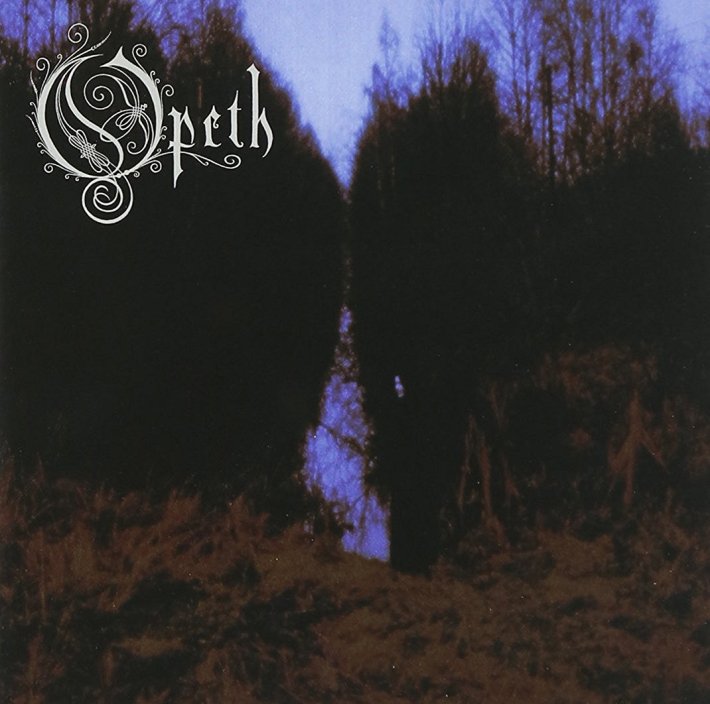
Aside from an unfortunate title that could probably work as the name of a collection of mercifully unreleased Bullet For My Valentine songs, My Arms, Your Hearse is one of those albums that becomes more infectious each year since its release. A large part of why that is comes from the album's sense of cohesion from track to track as opposed to being a collection of individual songs showcasing the band's musical assertion that they were better than your favorite band. Take that into consideration and the level of confidence from Opeth on the album's nine songs become an altogether different kind of power from a band who'd already shown their clout in just two records.
The band's first concept album, My Arms, Your Hearse succeeds on the running theme of its music with moments that find Opeth unafraid to let the music languish for the purpose of abruptly countering that frailty with overwhelming strength. Never mind that Åkerfeldt took on the role of guitarist, bassist, and vocalist for the album, My Arms, Your Hearse found Opeth in the unenviable position of either building on their previous releases, making a safe, lateral move, or YOLOing that shit into a new, undiscovered realm. Fortunately they went for that latter option.
With its dainty little opening instrumental, the album continues the trend of Åkerfeldt paying homage to his native country's folk music right before it nosedives into a blistering frenzy of heavy metal, death metal, and black metal all competing over which will be the first to eat its way through the amps. Attribute that to Åkerfeldt's theme binging or maybe the shedding of what was the last of the band's (few) compositional hangups, My Arms, Your Hearse succeeds in the coveted way of sounding not only like each song is headed somewhere but also in that the album as a whole feels absolute in its direction. Included on the album is one of the band's finest moments, "Demon Of The Fall." At a fraction of the running time of the group's prior songs, "Demon Of The Fall" served as one of the earliest examples of Opeth's ability in condensing just as much muscle in seven minutes as they did in 17.
My Arms, Your Hearse also found Åkerfeldt digging deeper with his vocals, a skill he would continue to develop in the album's follow-up, Still Life, and one which he would fully explore to great success on 2001's Blackwater Park. It's not as if Opeth somehow phoned it in for their first two records. On the contrary, those albums feel less like stepping stones to any other and more like individual album-length displays of a band's virtually infinite arsenal of techniques. With My Arms, Your Hearse, those abilities extended into the realm that suggested Opeth were just as suited to appeal as they were to annihilate.
2. Orchid (1995)
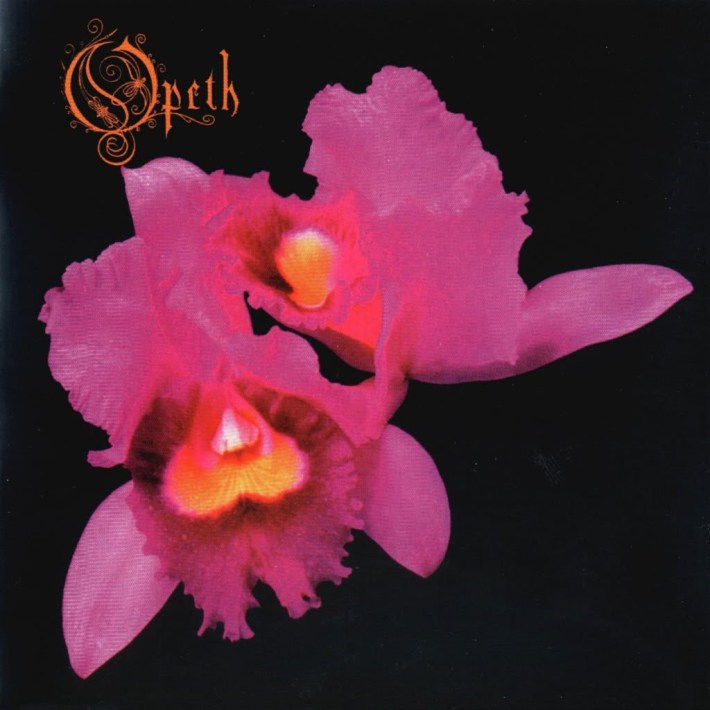
Released five years after the band's formation, Orchid is just as unlikely an album today as it was over two decades ago. That year, 1995, offered a buffet of what would become some of underground metal's most influential albums, including Dissection's Storm Of The Light's Bane, Cathedral's The Carnival Bizarre, At The Gates' Slaughter Of The Soul, Meshuggah's Destroy Erase Improve, and a whole host of others. The result of the respective bands working their way into a collective creative groove of sorts, those albums were a testament to growth over time and not without missteps along the way.
Listening to Orchid, it's not difficult to forget that it's a debut album. Not to say that debut albums by and large suck something fierce, Orchid was like the Kool-Aid man introduction to the underground metal world of the mid-'90s, only instead of just stopping at the hole in the wall, it destroyed everything else, too. Overstating aside, the historical context of Orchid is significant enough on its own, but the fact that the album remains virtually unduplicated is remarkable.
For a band whose members were, as the story goes, nervous in the studio while recording its songs, Orchid plays like the product of a well-oiled and well-experienced machine and not the result of four Swedish dudes a couple years removed from puberty just farting around on their guitars. Concerning its spot in the heavy metal timeline, the timing of Opeth's debut was impeccable. In the wake of the Varg Vikernes Shitshow just a year earlier, in many ways Orchid signaled a clear shift for heavy metal in general with the greatest change, at that time, falling squarely on black metal.
Combining death and black metal would've been old hat for Opeth, and while those elements are nothing less than certain in the band's music, it's likely they wouldn't have made as much as a whimper in 1995. A debut as game-changing as Orchid often works either to the detriment or benefit of the band who creates it. Bands who fall in love with their role as little spoon to the initial critical cuddle session will attempt a second-go at the same accident, or conversely, bands who for whatever reason just really didn't like accolades or success or (sometimes) money, will make something so deliberately contrarian that alienates them from the very fans who gave a shit about them in the first place.
Retrospect has provided a clear look at just what role Orchid has played in the Opeth story, and while the band's narrative reads like the metal incarnation of House Of Leaves, their beginning was a clear signal to that creative malleability all along. Progressive, folk, black metal, even ambient, Orchid isn't the try-hard clumsiness of a band really wanting to make a good album. It's the musical manifestation of genius, hard work, and lack of concern with distractions. In essence, Orchid is much more than the sum of its parts. It still stands as one of metal's finest debuts from one of its prestige acts.
1. Blackwater Park (2001)
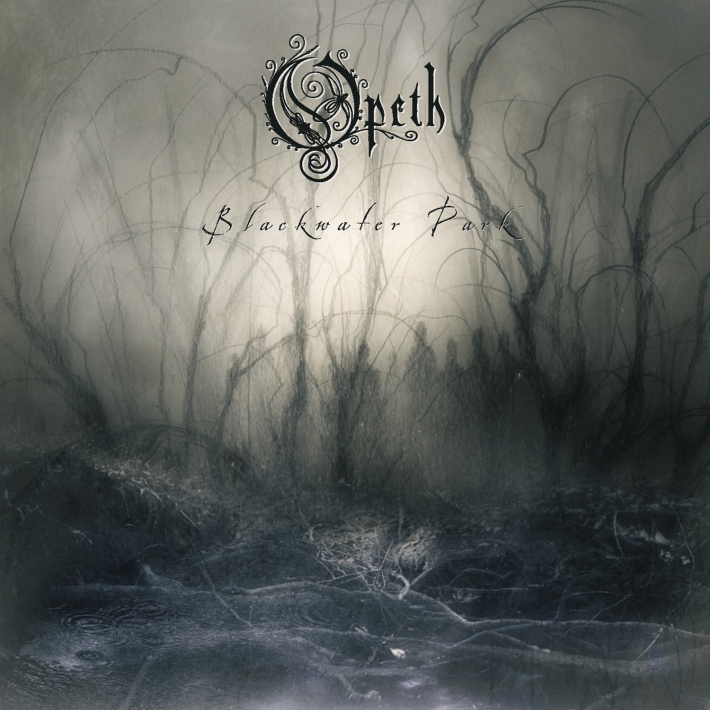
Sandwiched between 1999's Still Life and 2002's Deliverance/Damnation, Opeth's fifth studio album looks unassuming and typical of the band. Gray, dreary cover indicating sad times are ahead. Use of words "black" and "water" together to probably indicate death by drowning or just death and sadness in general. Hell, it even has a song called "Harvest," which brings to mind the calmingly irksome voice of Neil Young. For all that it provided in terms of the band continuing their familiar story, though, Blackwater Park provided a turning point for Opeth and, perhaps more importantly, for the metal genre in ways just as universally impactful now as they were then.
Coming six years after their debut, Blackwater Park was afforded the context of nü-metal's dominance over heavy metal in the mainstream arena. Even with those enormously successful acts and their respective releases, Opeth quietly leveled much of metal's playing field in February 2001. Accounting for the production talents (and guest vocals) of Grammy-winner Steven Wilson (Porcupine Tree) as well as the band's by then fully developed talent for balancing its effectiveness with each dynamic for the benefit of an entire album, Blackwater Park's command was the result of something like a perfect storm of inimitable talent, creative self-awareness, and experience.
As is the way of response to any band daring to be unconventional, Blackwater Park was of course met with the horns-up derision of fans who longed for the days of production that sounded like a tin can recording of a cat/raccoon cagematch. Those are great albums as has already been discussed, but nicer production does not a poser band make. Though there's been no scientific research of the topic, it's probably safe to assume that a large portion of bands do not actually want to sound like shit. Opeth's popularity by the time of Blackwater Park's release had caused their favor to wane with the hyper-elitist-crossed-arms-no-fun-ever subgroup of metal fans who were confounded and even heartbroken that the band had crossed the tolerable threshold of 50 fans.
To that effect, though, Blackwater Park made a compelling argument against conventions and expectations in a genre historically hellbent on ensuring its individualism by confining identity to the color scheme of a wardrobe and the fascist ostracism of any variances in taste, independent thought, gender, race, or inability to retain an encyclopedic knowledge of every vapid black metal band with the shelf life of a soap bubble. The fact is that Opeth's first four albums had already been a collective shrug regarding just how concerned the band was about "the scene." Blackwater Park was that same band still shrugging off distractions, only now there was an enormous distance between them and their contemporaries.
From its searing opener, "The Leper Affinity," to the climactic grandeur and raw power of its closing title track, Blackwater Park took on the form of its creators at their most daring and as a result challenged perceptions of the group as just another metal band from the same place where ABBA came from. Of course, Opeth were already well known due to their first four albums, though even in that realm of being "well known" in underground metal, the wide-ranging impact is relatively limited. With this release, Opeth's renown crept out from under any juvenile kvlt status and into a place that saw them gain the kind of fiercely loyal fanbase they still retain today.
Less habit than signature, those most prevalent traits of Opeth's sound find essential and not just comfortable spaces to occupy in Blackwater Park. Whether the subdued lead out guitar solo of "The Leper Affinity"or the beautifully somber choral harmonies of "Harvest" or Åkerfeldt's unmatched death metal grunt leading into the first verse of its title track, pulling out all the stops without being reckless, unleashing ferocity without losing control, offering emotion without being sentimental, Blackwater Park roars and whispers with the kind of perfect timing that would seem accidental, were it not for the band whose name is on the album cover.





